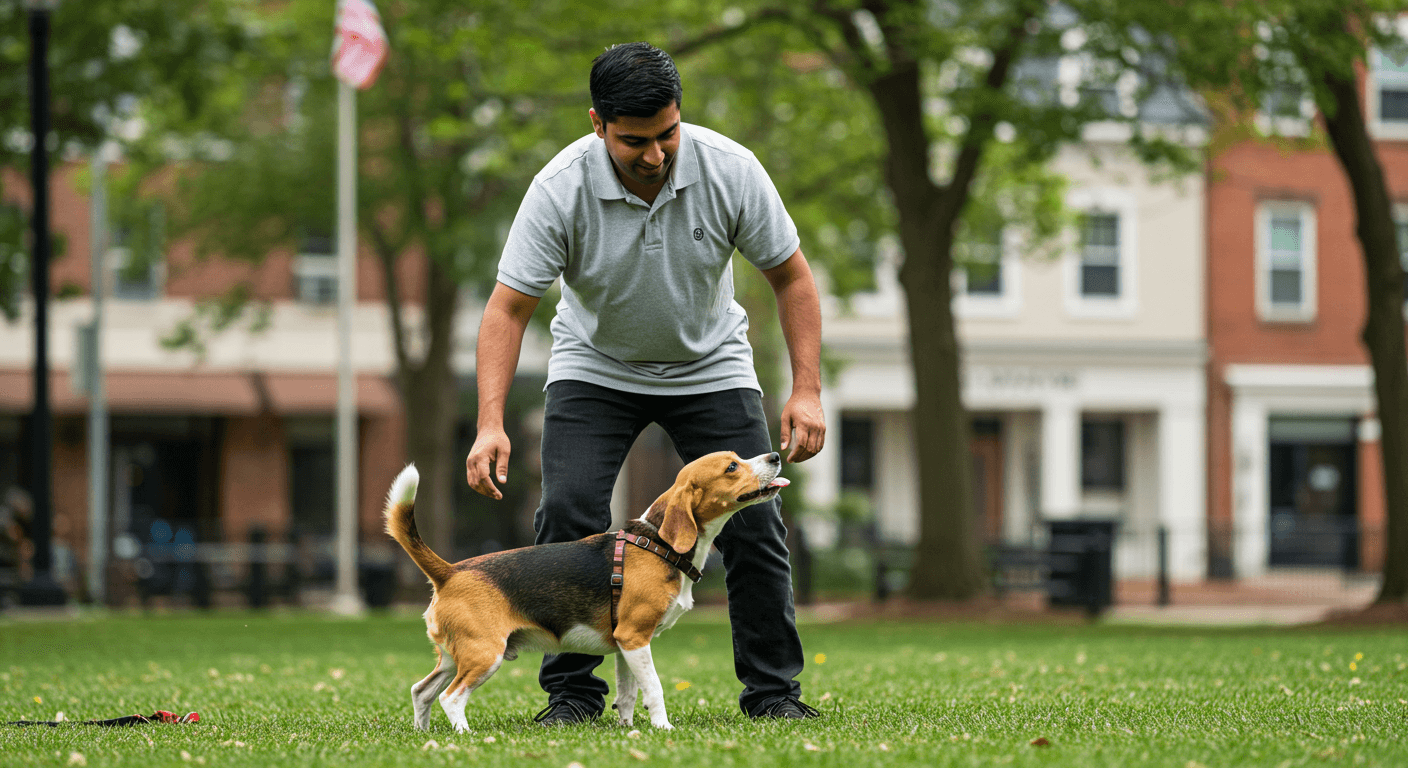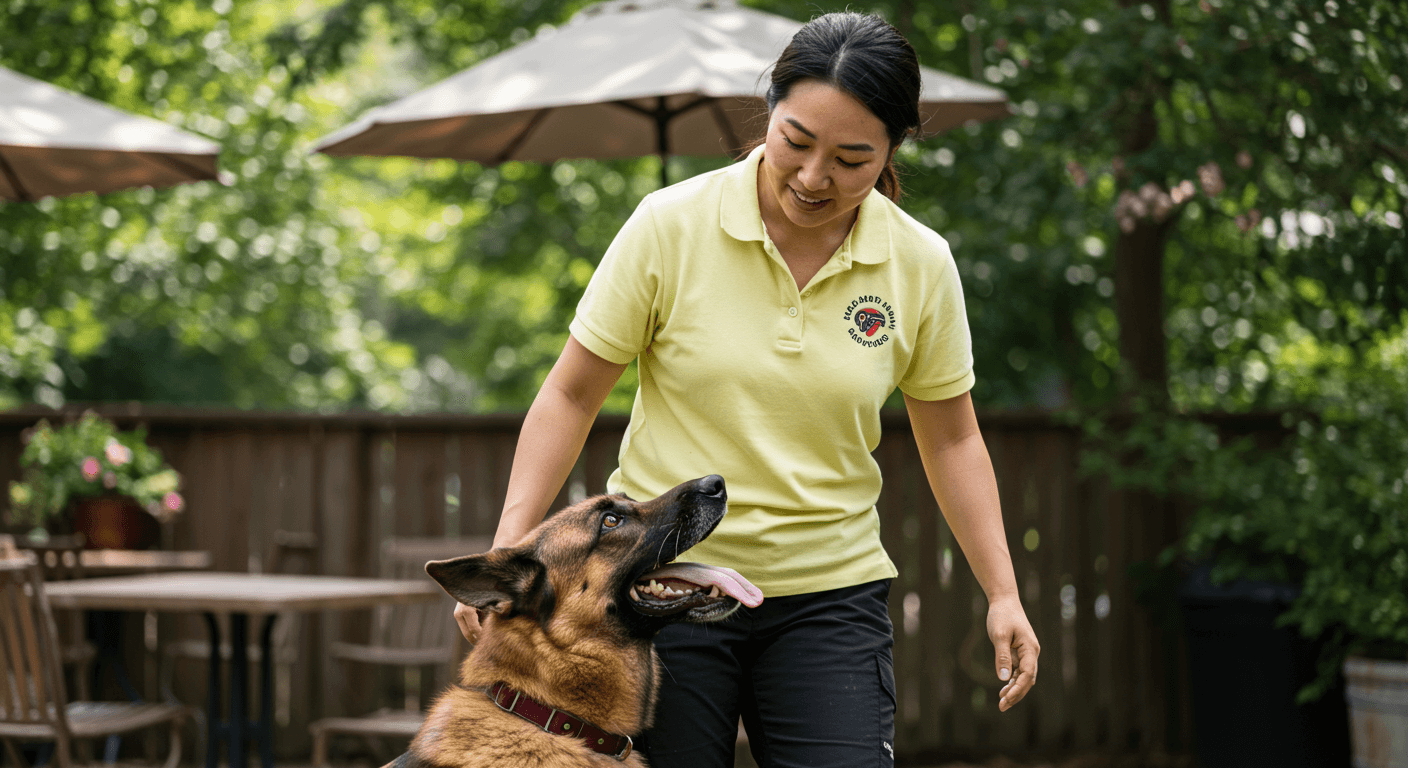Your Complete Guide to Choosing a Dog Trainer in New Jersey
Finding the right professional dog trainer in New Jersey means understanding what makes the Garden State unique for dog owners. From the busy boardwalks of the Jersey Shore to the suburban parks of Bergen County and the rural trails of Sussex County, your dog needs skills that match your specific lifestyle and local environment.
New Jersey’s mix of dense urban areas, quiet suburbs, and rural townships creates different training challenges depending on where you live. A dog in Newark faces different distractions than one in Cape May or Princeton, and the right training program should reflect those differences.
How to Choose the Right Trainer
Start by looking for someone who understands New Jersey’s regulations and can prepare your dog for the specific situations you’ll face in your community. That might mean calm behavior on crowded boardwalks, polite leash manners through downtown shopping districts, or reliable recall in state parks where wildlife encounters happen regularly.
Credentials matter because they show a trainer’s commitment to ongoing education and humane methods. Look for certifications like CPDT-KA, KPA-CTP, or IAABC-CDBC if you’re dealing with behavior problems. For serious aggression or reactivity issues, consider trainers with CBCC-KA or programs like CTC.
In-home dog training works particularly well for puppies learning household routines, dogs with doorbell reactivity, or any behavior that shows up most at home. Group classes make more sense once your dog can focus around other dogs, and they’re great preparation for busy public spaces.
Private lessons give you flexibility to work on exactly what matters most, whether that’s loose-leash walking through your neighborhood or building confidence around the traffic and commotion of New Jersey’s urban centers.
Common Dog Training Methods Explained

Positive reinforcement training builds the reliable behaviors you need while keeping your dog confident and happy to work with you. This approach also helps you stay within New Jersey’s animal welfare laws and local ordinances.
Basic obedience covers the foundation skills every dog needs: sit, down, stay, recall, and leash manners. These behaviors make daily life easier whether you’re visiting a farmers market, stopping at a café patio, or navigating crowded downtown sidewalks.
Puppy training focuses on socialization during those critical early months, plus potty training, bite inhibition, crate comfort, and early leash skills. Starting with short, positive training sessions prevents problem behaviors from developing in the first place.
Behavior modification addresses more complex issues like fear, reactivity toward people or dogs, resource guarding, or separation anxiety. This work requires careful desensitization and counterconditioning, and the best trainers coordinate with your veterinarian when needed.
Dog training classes offer structured group learning environments where dogs practice good manners around distractions. Quality classes screen participants carefully, give dogs enough space to feel comfortable, and teach calmness rather than just excitement.
Board and train programs can jumpstart progress when you’re short on time, but make sure the facility uses humane methods and includes thorough handoff sessions so you can maintain the training at home.
Service dog training and therapy dog training require specialized skills, including public access manners and task work that goes far beyond basic obedience. These programs need clear benchmarks and a trainer experienced in these specific fields.
Stay away from any trainer who relies on fear, pain, or intimidation. Those methods create new problems, damage your relationship with your dog, and can even violate New Jersey’s animal cruelty statutes.
Average Cost of Dog Training in New Jersey (Updated for 2025)
Prices across New Jersey vary based on the trainer’s experience, session length, location within the state, and whether you’re in a high-cost urban area or more affordable rural region. Here’s what most dog owners are paying in 2025.
| Service Type | Average Cost (New Jersey) |
|---|---|
| Puppy classes (4-6 weeks) | $175-$325 total |
| Group obedience classes (4-6 weeks) | $185-$350 total |
| Private lessons (60-90 min) | $125-$225 per session |
| In-home coaching packages (4-6 visits) | $475-$1,050 total |
| Day training (trainer works your dog + handoff) | $500-$1,100 per week |
| Behavior consult for reactivity/anxiety (initial) | $175-$300 |
| Board and train (2-4 weeks) | $2,200-$5,000 total |
Northern counties near New York City typically run higher than South Jersey or rural areas. Travel fees may apply if your trainer needs to drive significant distances, and expect higher rates for complex behavioral issues that require specialized expertise.
Before committing, ask what’s included in the package, how progress will be measured, and whether the trainer offers a free consultation to assess fit.
Questions to Ask a Potential Dog Trainer
- What training methods do you use, and how do you ensure training sessions stay positive and low-stress?
- What dog trainer certifications do you hold, and do you continue your education through programs like CPDT-KSA?
- How will you customize the training program for my dog’s specific needs and our New Jersey lifestyle?
- Do you offer in-home training, group classes, or day training, and which approach fits my goals best?
- How will we track my dog’s progress and know when to add more challenging distractions?
- What are the total costs including any travel fees, and what’s your cancellation policy?
- Do you carry liability insurance, and can you provide proof?
- For behavior problems, will you coordinate with my veterinarian if needed?
- What should I practice between sessions to help my dog continue improving?
- Have you worked with dogs in environments similar to mine, whether that’s urban, suburban, or rural New Jersey?
Local New Jersey Rules and Considerations
New Jersey takes animal welfare seriously, with state laws that set baseline standards and local ordinances that add community-specific requirements. Understanding these rules helps you train a well-behaved dog who fits smoothly into your neighborhood.
Leash laws vary by municipality throughout New Jersey, but most towns require dogs to be leashed in public spaces except inside designated off-leash areas. Check your local township or city ordinances for specific requirements, as some communities have stricter rules than others.
New Jersey requires all dogs over six months old to be licensed annually in the municipality where the owner resides. You’ll need proof of current rabies vaccination to get that license, and tags must be worn on the dog’s collar.
The state mandates rabies vaccination for all dogs, cats, and ferrets over seven months old. You can find details about vaccination schedules and requirements through the New Jersey Department of Health‘s rabies information resources.
Excessive barking falls under nuisance regulations in most New Jersey communities, so work with your trainer on managing alert barking and separation anxiety before neighbors file complaints with animal control.
New Jersey doesn’t require specific licensing for dog trainers themselves. However, if a trainer operates a boarding facility as part of board and train services, they must comply with the state’s kennel licensing requirements under the New Jersey Division of Consumer Affairs.
Liability insurance isn’t legally required for dog trainers in New Jersey, but reputable professionals carry it to protect themselves and their clients. Always ask to see proof of coverage.
Some municipalities require permits for commercial dog training activities in public parks. If your trainer wants to hold training sessions in local parks, they should handle any necessary permits and insurance documentation.
Local New Jersey Resources for Dog Owners
These locations offer excellent opportunities to practice good manners, work on training skills, and provide safe enrichment for your dog. Always follow posted rules and practice good dog park etiquette.
- Liberty State Park in Jersey City welcomes leashed dogs on walking paths with views of the Manhattan skyline, perfect for building focus around crowds and city distractions.
- Thompson Park Dog Park in Monroe Township (Middlesex County) offers separate fenced areas for large and small dogs, giving you a safe space to practice recall and socialization.
- Pooch Park at Oak Ridge Park in Clark (Union County) features fenced play areas where dogs can safely work on off-leash skills.
- Cape May beaches allow leashed dogs during specific hours in the off-season, providing excellent distraction training opportunities around sand, water, and wildlife.
- Delaware and Raritan Canal State Park Trail runs through multiple counties and offers miles of leashed walking paths ideal for building endurance and loose-leash skills.

FAQs
How much does in-home dog training cost?
Most professional dog trainers in New Jersey charge $125-$225 per in-home session, with package discounts available when you buy multiple visits upfront. Behavior modification work for issues like reactivity or aggression typically starts at the higher end of that range.
Is in-home dog training worth it?
Absolutely, because you’re addressing problems in the exact environment where they happen. Your trainer can work on door manners when the doorbell rings, jumping on guests in your actual living room, counter-surfing in your kitchen, and leash skills on the sidewalks and streets you walk every day.
Can you pay someone to house train your dog?
Yes, many trainers offer puppy programs that include potty training protocols, crate training routines, and daily schedules. Day training can speed up the process significantly while teaching you how to maintain consistency when the trainer isn’t there.
What is the 3-3-3 rule for dog training?
This guideline helps set realistic expectations for newly adopted dogs: expect about 3 days for your dog to decompress and start feeling safe, 3 weeks to learn your household routines and rules, and 3 months to feel fully settled and confident. Good training programs work with this natural adjustment timeline rather than against it.
How long will it take to reach my training goals?
Most puppies and friendly adult dogs show solid progress in 4-8 weeks if you practice daily between training sessions. Fear-based behaviors, reactivity, and aggression typically require several months of careful behavior modification with gradual increases in difficulty and distractions.
What should I bring to group classes?
Pack a flat collar or well-fitted harness, a standard 6-foot leash, high-value treats your dog loves, water, and current vaccination records if your trainer requests them. Leave retractable leashes at home since they make it harder to maintain control in group settings.
What’s the leash law in New Jersey?
Leash laws vary by municipality across New Jersey. Most towns require dogs to be on leash in all public areas except designated off-leash dog parks. Check your specific township or city ordinances for local requirements, as some communities have stricter regulations than others.
Do I need a dog license in New Jersey?
Yes, New Jersey requires all dogs over six months old to be licensed annually in the municipality where you live. You’ll need proof of current rabies vaccination to obtain the license, and your dog must wear the license tag on their collar at all times.
What shots does my dog need in New Jersey?
New Jersey law requires rabies vaccination for all dogs over seven months old. Your veterinarian will likely also recommend core vaccines like distemper, parvovirus, and adenovirus, plus bordetella if your dog will attend group classes or daycare. Check the New Jersey Department of Health’s rabies program page for current requirements.
Are dog trainers required to be licensed in New Jersey?
No, New Jersey doesn’t require specific licenses or certifications for dog trainers. However, trainers who operate boarding facilities must comply with the state’s kennel licensing requirements through the New Jersey Division of Consumer Affairs. Look for certified dog trainers who hold credentials from recognized organizations to ensure they follow humane, science-based methods.
Where can I practice off-leash recall?
Use fenced dog parks throughout New Jersey to practice off-leash skills safely and legally. Many counties and municipalities maintain designated dog parks with secure fencing. You can also rent private training fields or look for expert dog trainers who offer supervised recall training in controlled environments.
Which dog parks allow training around New Jersey?
Most public dog parks in New Jersey welcome training activities as long as you follow posted rules and don’t disrupt other park users. Thompson Park Dog Park in Monroe Township, Pooch Park at Oak Ridge Park in Clark, and many county and municipal dog parks allow owners to work on obedience and socialization skills. Avoid peak hours when practicing new behaviors, and always monitor your dog’s comfort level around other dogs.
What beaches or trails allow dogs for training?
Many New Jersey beaches allow leashed dogs during off-season months or specific hours, including beaches in Cape May, Wildwood, and Seaside Heights. Delaware and Raritan Canal State Park Trail, Palisades Interstate Park, and many county parks welcome leashed dogs year-round. These locations provide excellent opportunities to practice leash training around distractions like wildlife, cyclists, and other dogs. Always verify current rules before visiting since regulations can change seasonally.
How do I find a trainer who uses positive methods?
Look for trainers who emphasize positive reinforcement training and avoid those who use shock collars, prong collars, or other aversive tools. Ask about their training philosophy during your free evaluation, and request to observe a training session if possible. Certified professionals with credentials like CPDT-KA or KPA-CTP have demonstrated knowledge of reward-based methods.
What if my dog has aggression issues?
Aggressive dog training requires specialized expertise in behavior modification. Look for a trainer with advanced certifications in behavior consulting who can create a careful desensitization plan. Many behavior professionals in New Jersey work closely with veterinary behaviorists for complex cases, and some aggression issues may benefit from medication alongside training.
Can I train my service dog myself in New Jersey?
New Jersey law doesn’t require service dogs to be professionally trained, so owner-training is legal. However, service dog training demands extensive knowledge of public access standards, task training, and legal requirements. Many owners work with experienced trainers to ensure their dog meets the high standards required for public access rights.
Are there training requirements for therapy dogs?
Therapy dog training typically requires your dog to pass a behavioral evaluation like the AKC Canine Good Citizen test, plus certification through an organization like Pet Partners or Therapy Dogs International. Your dog will need strong basic obedience, excellent socialization skills, and a calm temperament around medical equipment and unpredictable environments.
The right combination of humane training methods, consistent practice, and knowledge of New Jersey’s specific regulations will help your dog become a confident, well-mannered companion. Whether you’re navigating boardwalk crowds at the shore, hiking state park trails, or simply walking through your neighborhood, investing in quality dog training services pays off every single day.
